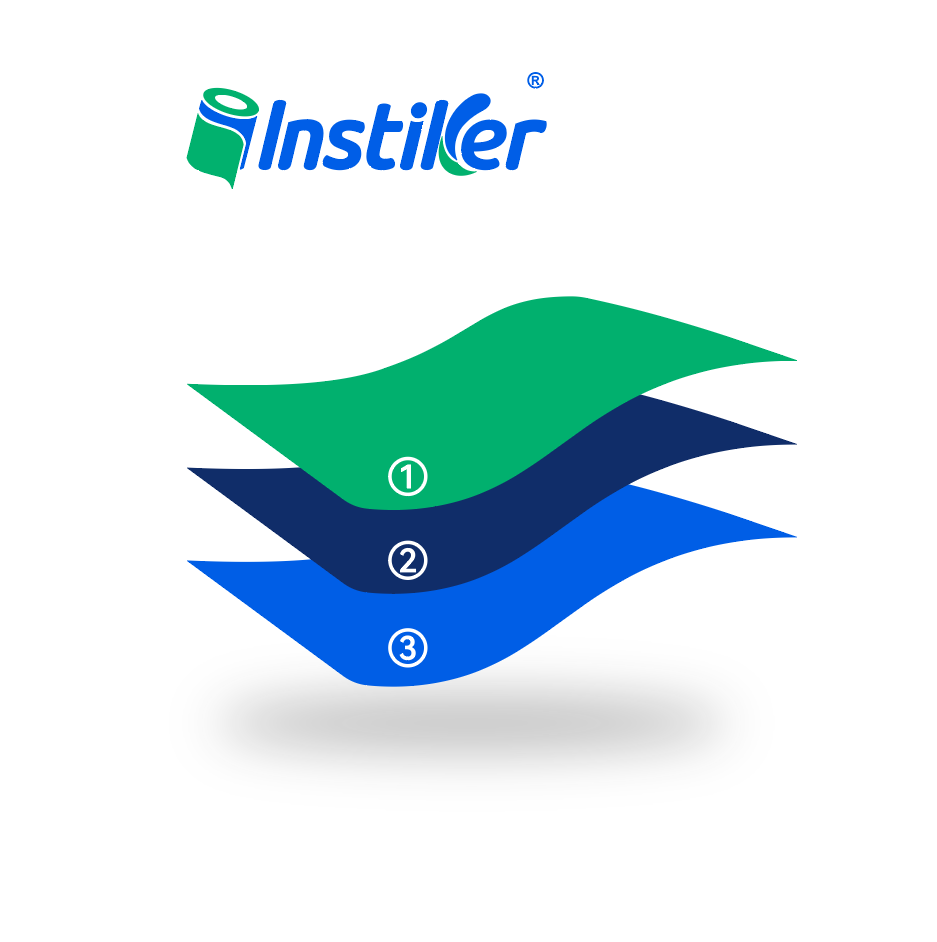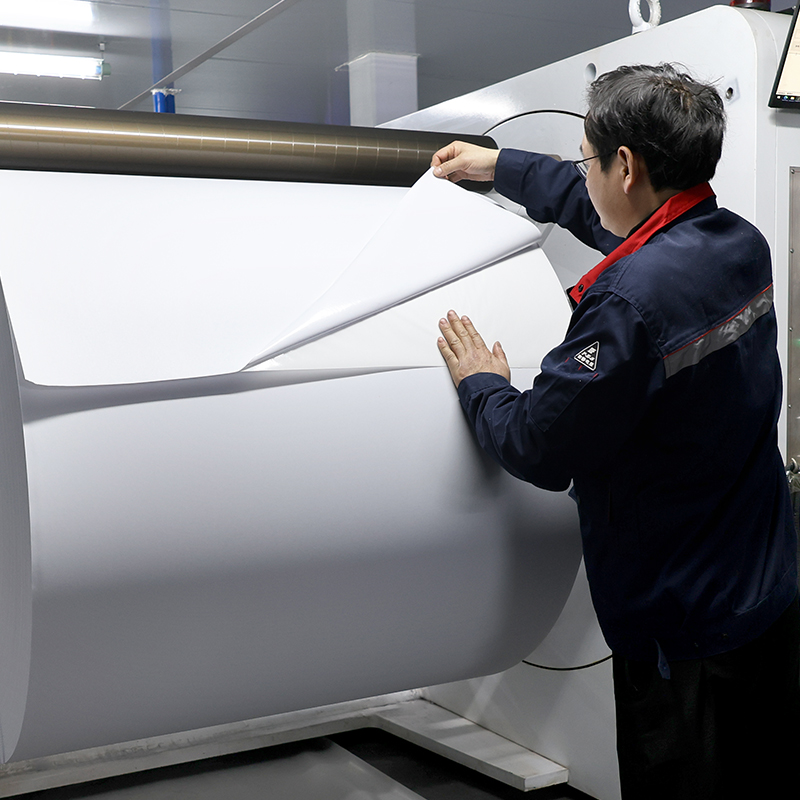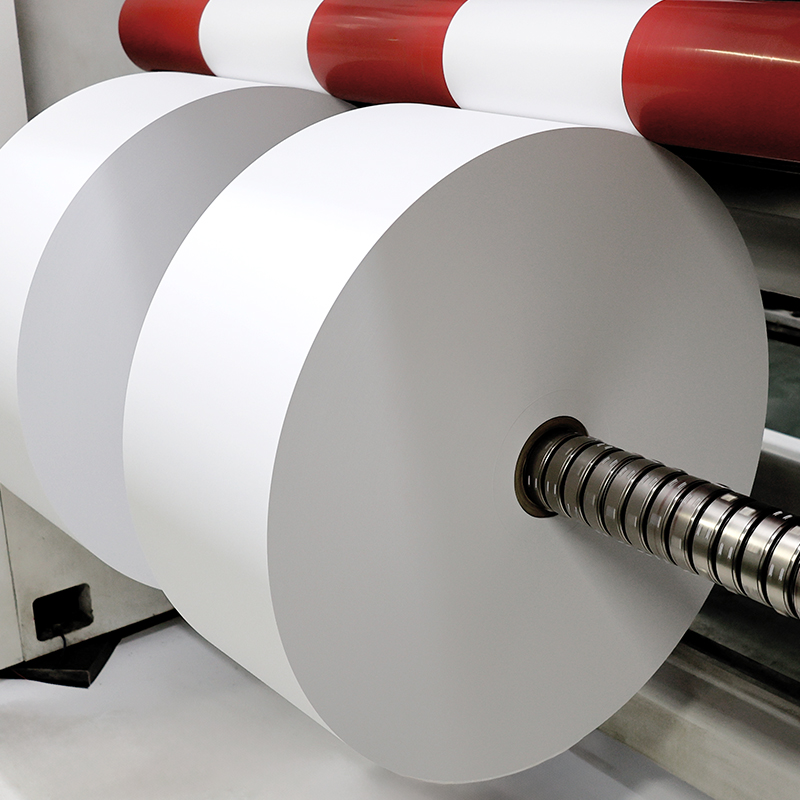Email:
Tel:
+86-18023461748
378 Maxin Road , Zhongluotan Town ,
Baiyun District , Guangzhou City China













YH23928
Instiker
| Color: | |
|---|---|
| Size: | |
| Material: | |
| Application: | |
| Availability: | |
| Quantity: | |

Product Name: 70g Thermal Transfer Paper Acylic 60g White Glassine
1. Face Stock: Thermal Transfer Paper
Caliper (μm). 67±5% GB/T 451.3-2003
Weight (g/㎡): 69±5% GB/T 451.2-2002
2. Adhesive Performance: Acrylic
Initial Adhesion (N): 10.72 FTM 9
20 min.180'Peel Adhesion (N/25mm) : 12.25 FTM 1
20 min.90'Peel Adhesion (N/25mm): 10.06/Material tore off FTM 2
Storage Temperature: -15°C to 70°C
Minimum Lakelling Temperature: 10°C
3. Liner: White Glassine
Caliper (μm): 52±5% GB/T 451.3-2003
Weight (g/㎡): 60±5% GB/T 451.3-2003
It can be stored for 1 year at the temperature of 23+2°C and relative humidity of 50+5%
It is widely used in bar code printing and normal printing, die-cutting performance is excel-White Glassine lent. Excellent performance on many packaging materials.
It is widely used in various printing processes. Attention should be paid to controlling the viscosity of the ink to avoid the loss of the coating caused by over-viscous ink. Avoid exces-sive rewinding tension, which may cause label glue overflow. Simple text printing and bar code printing are recommended.
* Industrial identification: Durable labels for electronic components and mechanical equipment.
* Clothing hang tags: Washing instructions, ingredient information labels.
* Barcode labels: Warehouse management, retail product barcode labels.
Q: Is this label fully recyclable?
A: Yes, the synthetic face stock and recycled kraft liner are both recyclable in plastic and paper streams, respectively. Remove adhesive residue before recycling.
Q: Can it be composted?
A: The face stock and adhesive are certified for industrial composting (OK Compost Industrial), breaking down into organic matter within 12 weeks under controlled conditions.
Q: How does it compare to traditional paper labels in wet environments?
A: The synthetic fibers repel water, making it 300% more moisture-resistant than kraft or paper labels, ideal for refrigerated or outdoor applications.
Q: Does the eco-friendly adhesive affect bonding strength?
A: No, the plant-based adhesive matches the performance of traditional acrylic adhesives, with a peel adhesion of 10N/25mm on stainless steel, ensuring reliable substrate bonding.



Product Name: 70g Thermal Transfer Paper Acylic 60g White Glassine
1. Face Stock: Thermal Transfer Paper
Caliper (μm). 67±5% GB/T 451.3-2003
Weight (g/㎡): 69±5% GB/T 451.2-2002
2. Adhesive Performance: Acrylic
Initial Adhesion (N): 10.72 FTM 9
20 min.180'Peel Adhesion (N/25mm) : 12.25 FTM 1
20 min.90'Peel Adhesion (N/25mm): 10.06/Material tore off FTM 2
Storage Temperature: -15°C to 70°C
Minimum Lakelling Temperature: 10°C
3. Liner: White Glassine
Caliper (μm): 52±5% GB/T 451.3-2003
Weight (g/㎡): 60±5% GB/T 451.3-2003
It can be stored for 1 year at the temperature of 23+2°C and relative humidity of 50+5%
It is widely used in bar code printing and normal printing, die-cutting performance is excel-White Glassine lent. Excellent performance on many packaging materials.
It is widely used in various printing processes. Attention should be paid to controlling the viscosity of the ink to avoid the loss of the coating caused by over-viscous ink. Avoid exces-sive rewinding tension, which may cause label glue overflow. Simple text printing and bar code printing are recommended.
* Industrial identification: Durable labels for electronic components and mechanical equipment.
* Clothing hang tags: Washing instructions, ingredient information labels.
* Barcode labels: Warehouse management, retail product barcode labels.
Q: Is this label fully recyclable?
A: Yes, the synthetic face stock and recycled kraft liner are both recyclable in plastic and paper streams, respectively. Remove adhesive residue before recycling.
Q: Can it be composted?
A: The face stock and adhesive are certified for industrial composting (OK Compost Industrial), breaking down into organic matter within 12 weeks under controlled conditions.
Q: How does it compare to traditional paper labels in wet environments?
A: The synthetic fibers repel water, making it 300% more moisture-resistant than kraft or paper labels, ideal for refrigerated or outdoor applications.
Q: Does the eco-friendly adhesive affect bonding strength?
A: No, the plant-based adhesive matches the performance of traditional acrylic adhesives, with a peel adhesion of 10N/25mm on stainless steel, ensuring reliable substrate bonding.


Thermal transfer compatibility, The surface coating is optimized to be compatible with thermal transfer ribbons for printing. High-temperature resistance, The printed content is scratch-resistant and fade-resistant.
The acrylic adhesive provides a strong and reliable bond. It adheres well to a wide range of surfaces, including plastic, metal, and cardboard. This adhesive is resistant to environmental factors such as humidity and moderate temperature changes, ensuring that the labels stay firmly in place over time.
The 60g white glassine liner protects the acrylic adhesive during storage and transportation. Its smooth surface allows for easy release of the label, which is essential for efficient application in high - volume production settings.

Thermal transfer compatibility, The surface coating is optimized to be compatible with thermal transfer ribbons for printing. High-temperature resistance, The printed content is scratch-resistant and fade-resistant.
The acrylic adhesive provides a strong and reliable bond. It adheres well to a wide range of surfaces, including plastic, metal, and cardboard. This adhesive is resistant to environmental factors such as humidity and moderate temperature changes, ensuring that the labels stay firmly in place over time.
The 60g white glassine liner protects the acrylic adhesive during storage and transportation. Its smooth surface allows for easy release of the label, which is essential for efficient application in high - volume production settings.

Thermal paper is widely used in various instant printing scenarios due to its low cost and ease of operation. However, it is necessary to pay attention to its limitation of being sensitive to the environment. By reasonably setting printing parameters, standardizing the preservation process, and combining digital means, the utilization efficiency of thermal paper and the retention time of information can be effectively improved. At the same time, choosing environmentally friendly phenol-free thermal paper can also reduce the potential impact on human health and the environment.
Thermal paper is widely used in various instant printing scenarios due to its low cost and ease of operation. However, it is necessary to pay attention to its limitation of being sensitive to the environment. By reasonably setting printing parameters, standardizing the preservation process, and combining digital means, the utilization efficiency of thermal paper and the retention time of information can be effectively improved. At the same time, choosing environmentally friendly phenol-free thermal paper can also reduce the potential impact on human health and the environment.